#next thing she knew she's already reborn in modern japan
Text
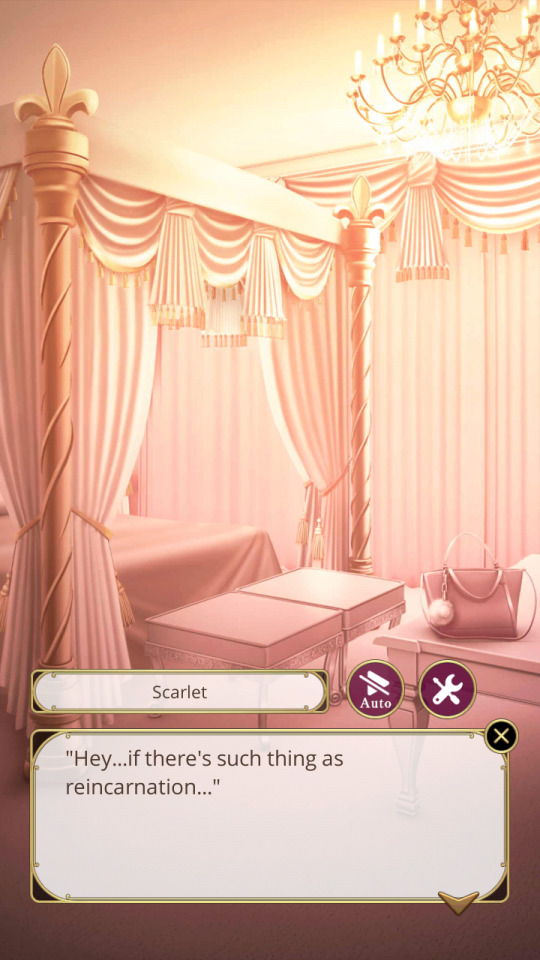

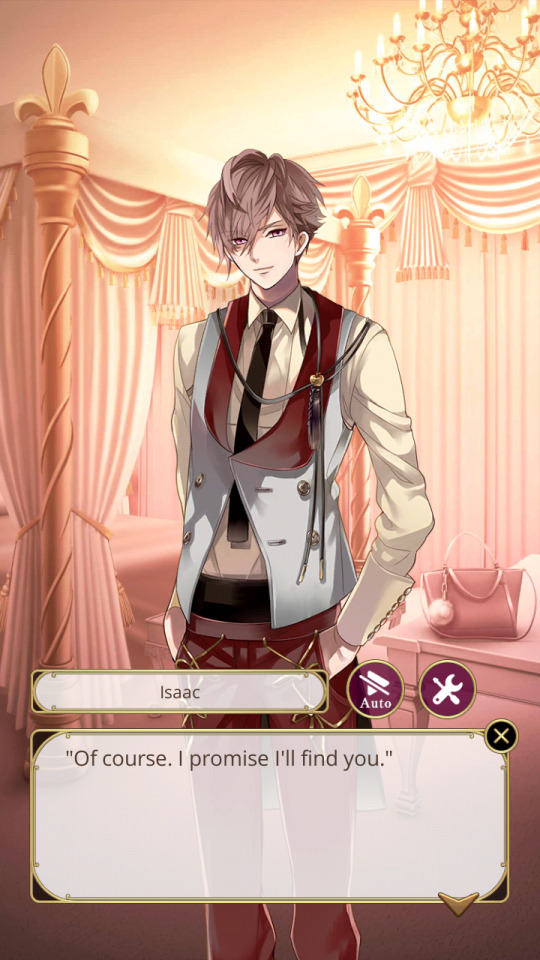
"I remembered closing my eyes and feeling happy, and then that was it."
#next thing she knew she's already reborn in modern japan#Our Love Written in the Stars#Isaac Newton#Ikemen Vampire#quotes
28 notes
·
View notes
Text
Soul summoning and Father’s return from Yomi
For someone who supposedly hates Father, I sure talk a lot about him, huh
While I was flipping through the pages of the manga, I once again came to a stop at the soul summoning scene in chapter 37. Specifically at Nora’s tale about Father escaping from Yomi, which I, apparently, did not pay due attention to.
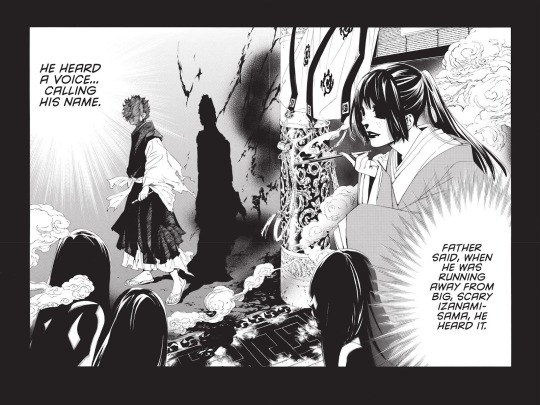
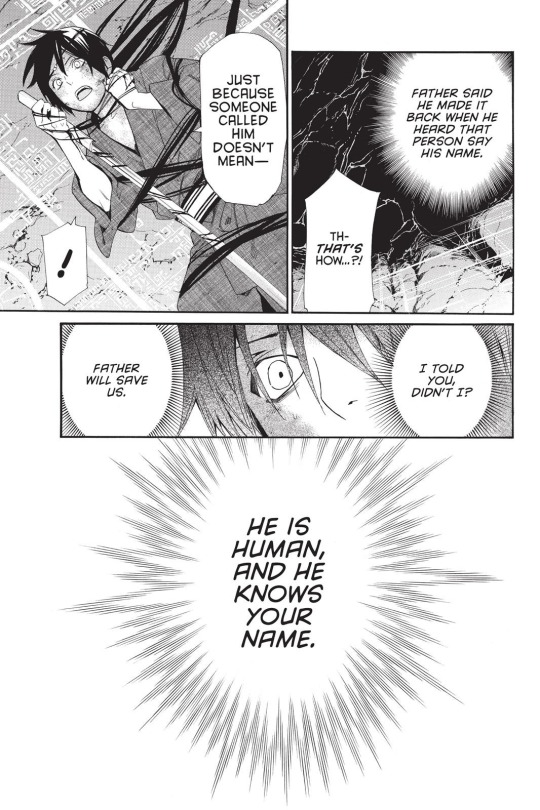
I’ve never had a single opinion on how Father got in and out of Yomi, so I toyed with a few.
1. When Father was still human, he was already interested in researching ayakashi (like Ebisu, for example), somehow learned about the kotonoha (the Word of Yomi) and decided to get one for himself. He voluntarily ventured into Yomi but asked the pock-marked girl to soul call him beforehand, and she did just that.
2. The pock-marked girl died, and Father got mad at the gods for being directly or indirectly involved. He went to Yomi to get her back, stumbled upon Izanami, saw the brushes in action, and either stole or wheedled out one of them.
3. Father was the one who died while the pock-marked girl lived. While in Yomi, Father encountered Izanami, learned about the brushes, and got his hands on one of them.
In this post I want to examine the last option – the one in which Father died and was resurrected by that girl of his through soul summoning.
First of all, let me remind you that soul summoning isn’t something Adachitoka came up with specifically for Noragami, but an actual Japanese tradition.
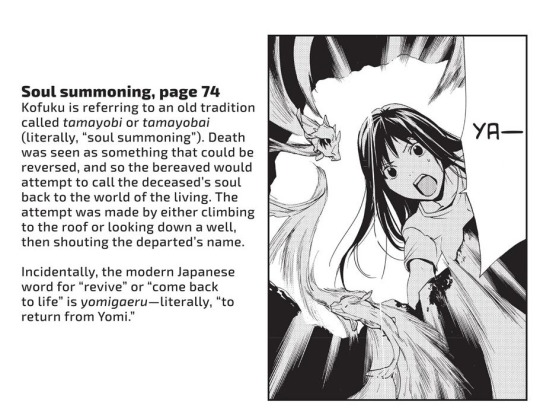
I think it’s reasonable to assume that whatever exists in our world is also a thing in Noragami universe. All the locations that we see in the series, specifically shrines, are real places (with the exception of the characters’ houses, Takamagahara and Yomi, obviously). This means that the tradition of soul summoning can easily exist in-universe.
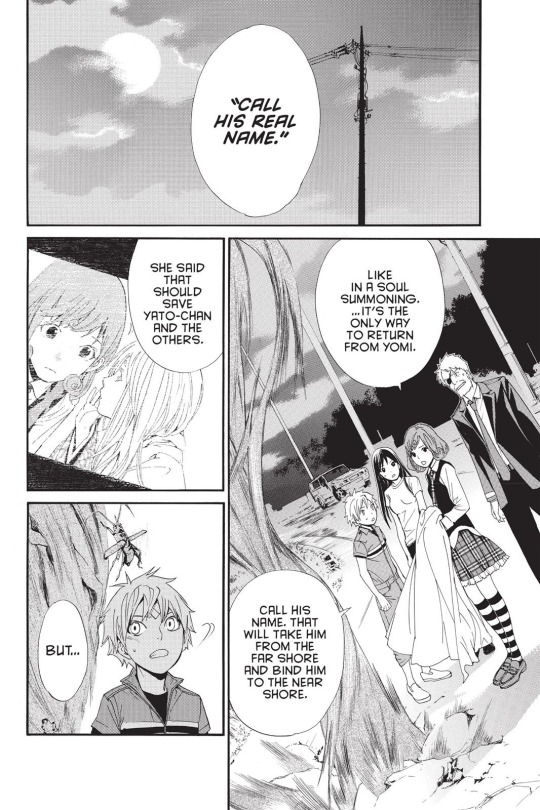
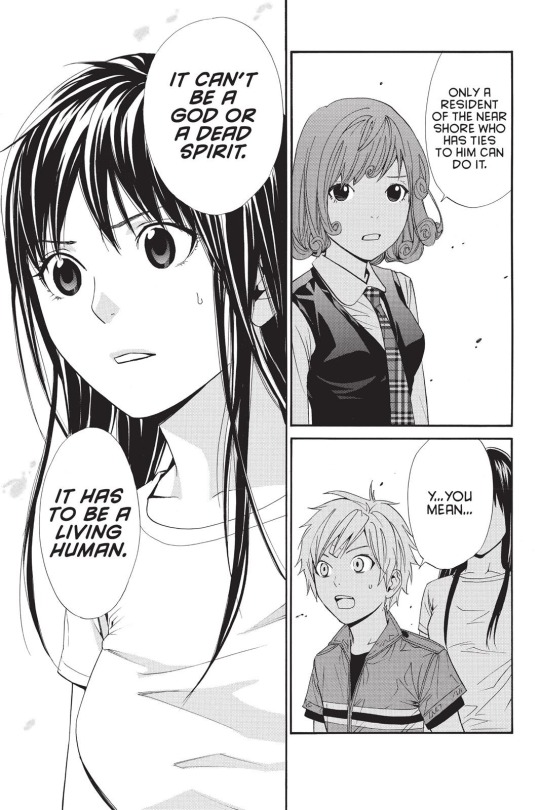
Maybe it’s just me (or the translation), but the way Kofuku talks about soul summoning seems to imply that she knows what it is and expects others to know about it, too. Apparently, they just never thought of using it on a god because it’s a human tradition.
And it goes against everything both Father and Amaterasu say.
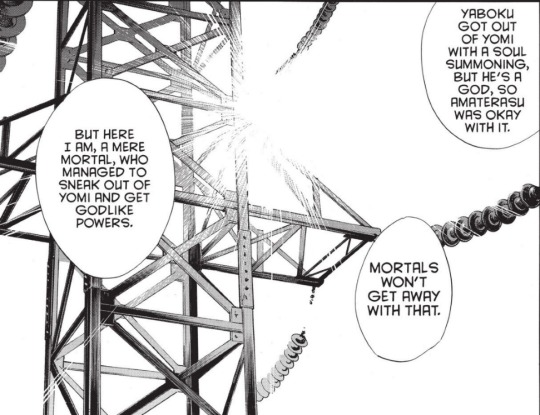
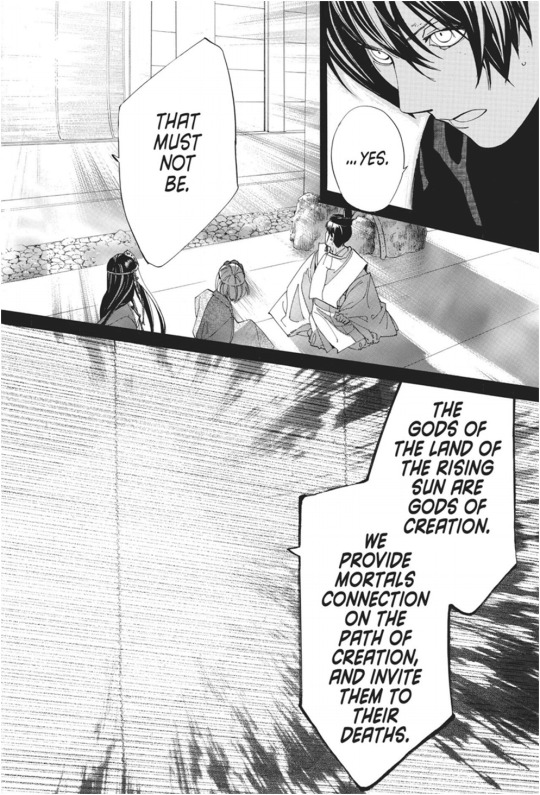
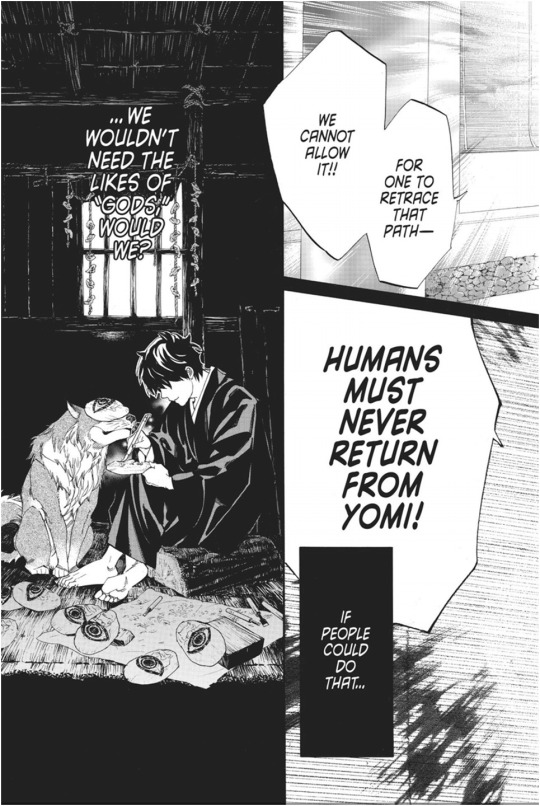
Amaterasu says humans can’t (mustn’t) come back to life at all, Father implies he is the only one who’s managed to return from Yomi/come back to life. How do we reconcile these statements with people climbing on roofs and staring down wells trying to revive their loved ones? The answer is – people did all that, they just weren’t successful. Except for the pock-marked girl.
I’m absolutely sure she was the one who called Father back from Yomi, thanks to a discussion I stumbled upon here on Tumblr.
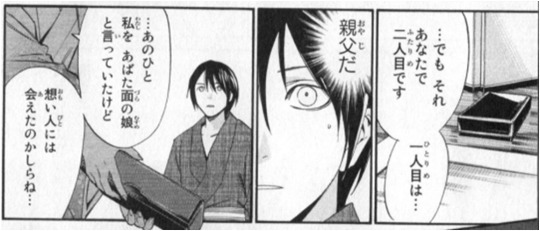
@sayaka19fan gave an alternate translation of this scene that differs from both the official transalation and the fan scanlation: “Even if he said I was a girl with pock marks I wonder if she was his loved one”. Aka “he was cold to me, even if I had her appearance”. So Father being distant made Izanami question her choice of appearance and wonder if she impersonated the wrong person.
If the girl was alive, then Father not being swayed by Izanami is easily explained, he simply knew that whoever was in front of him couldn’t have been that girl. This rules out her dying first and Father coming to Yomi to retrieve her the way Izanagi came after Izanami (not to mention that this particular scenario would require some other person to call Father’s name). So between the two of them, Father was the only one who got into Yomi.
The thing about Yomi is that it’s unclear whether it’s really a place where people go after their deaths. On the one hand, you have this word “yomigaeru” - to come back to life = to return from Yomi. On the other hand, there are opinions like this one:
In no ancient Shinto textual source is it explained who exactly goes to Yomi and why. Some historians suggest that the concept of a life after death was not a familiar one to the ancient Japanese and it only took form with the introduction of Buddhism from China in the 6th century CE. Yomi certainly has a very limited place in Shinto thought where a life after death is only vaguely alluded to and where there is an absence of a general concept of punishment and reward for souls in the next life as found in many other religions. The only suffering of souls in Yomi, if indeed there is any at all, is their separation from their living loved ones. The noted Shinto scholar and theologian Hirata Atsutane (1776-1843 CE) explains Yomi and its limited significance thus,
“The old legends that dead souls go to Yomi cannot be proven. Then it may be asked, where do the souls of the Japanese go when they die? It may be clearly seen from the purport of ancient legends and from modern examples that they remain eternally in Japan and serve in the realm of the dead governed by Okuninushi-no-kami. This realm of the dead is not in any one particular place in the visible world, but being a realm of the darkness and separated from the present world, it cannot be seen…
The darkness, however, is only comparative. It should not mistakenly be imagined that this realm is devoid of light. It has food, clothing, and houses of various kinds, similar to those of the visible world. Proof of this may be found in accounts…in which a person has occasionally returned to tell of the realm of the dead.
After death the soul leaves the body and resides in the area of the grave, a fact attested by countless accounts…of both ancient and modern times of miraculous occurrences by spirits in the vicinity of graves…Some say that the soul goes to the filthy realm of Yomi, but there is not a shred of evidence that this is the case”. (Scott Littleton, 94)
Even in the manga itself Yato and Ebisu didn’t encounter a single soul when they were in Yomi, only ayakashi and Izanami’s maidens. Then again, we learned in chapter 86 that where souls go in their afterlife depends on what they believed in when they were alive. So technically, if Father believed that dead souls end up in Yomi, that’s where he could have gone after he died.
Why do I now think that he died and didn’t venture into Yomi as a living person specifically to get the kotonoha? Again, it all comes down to the pock-marked girl. I think that her death could have been, in FMA terms, an “equivalent exchange” for Father’s return from Yomi.
See, gods in Noragami are pretty powerful, I give them that. They can, for example, turn into giant spiders (Ookuninushi) and lightning (Takemikazuchi). And while the series never really explains how exactly Tenjin goes about helping students get better marks, or how Ebisu helps businesses, I’m pretty sure that gods can alter reality to some extent. However, they aren’t all-powerful, and there’s one thing they can do nothing about – death.
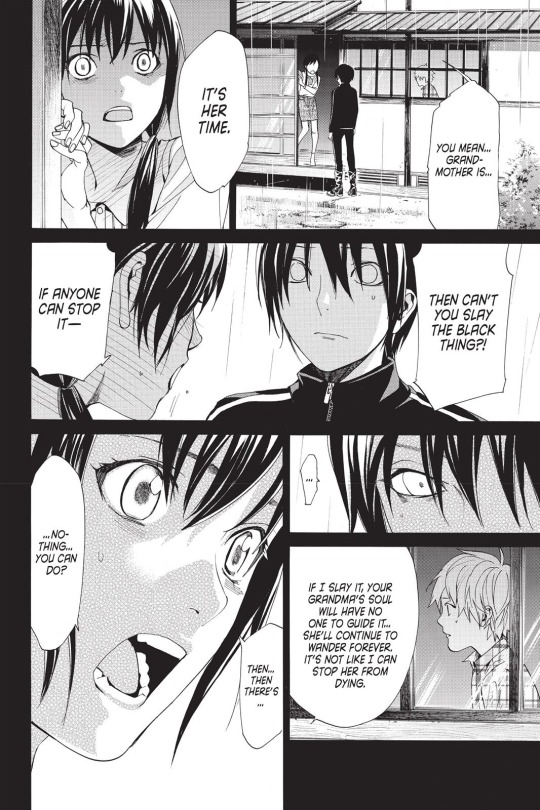
Of course, we should take into account that Yato isn’t exactly a god of healing to at least theoretically be able to postpone someone’s death (he can totally do the opposite though). I do think, however, that any other god would have said the same, because this is the one thing the gods cannot change. They can’t postpone death because the circle of life is the nature of things and shouldn’t be meddled with. Not because “Amaterasu said so”, but because that’s how the world is. Who made the world like this is a tricky question to answer, since to extent to which the Japanese cosmogoniс myth is applicable to Noragami, aka what came first, the egg or the hen, is a topic for a discussion of its own.
Bottom line is, if Father came back from the dead, something had to balance that out, and that something was the pock-marked girl’s death. It wasn’t a punishment from the Heavens for his breaking out of Yomi, which the Heavens, apparently, don’t even know about. It wasn’t an injustice that some god committed, ‘cause gods had nothing to do with it all. Father became bitter at the world for taking the pock-marked girl away from him, at the gods who didn’t help him when he needed them, and at humans who created and support those useless gods. The clothes Father was wearing when he was escaping from Izanami are the same ones he was in when he was hugging the girl in chapter 60. If this is how things went, then the effect of his return was immediate – as soon as he came back, the girl died.
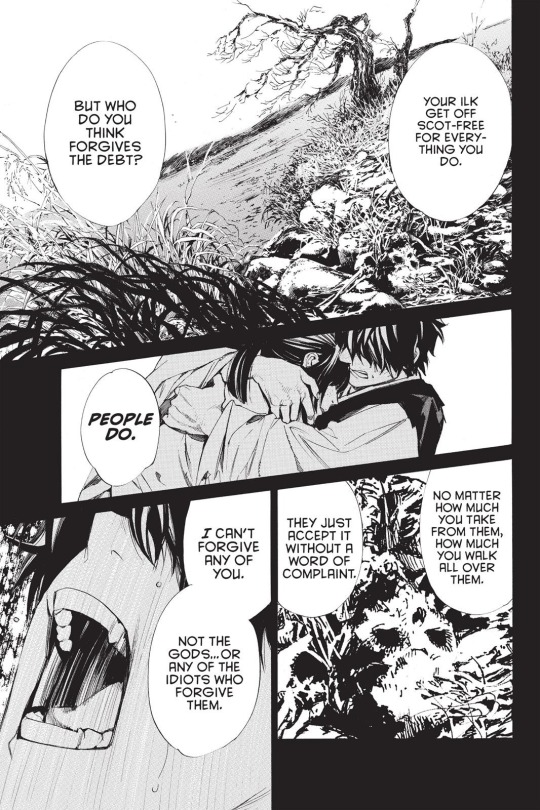
There’s one more thing that bothers me about Father – how he’s survived after his return from Yomi, specifically how he changes bodies. It’s hard to tell if he had a body in the scenes from Yato and Nora’s childhood, since Far shore beings can interact with the real-life objects (food, clothes) just fine. All we know is that he’s had the same appearance in Yomi, in Yato and Nora’s childhood, and even now; and also that he doesn’t just possess bodies, but their souls as well. His current “host” Fujisaki is a third year high-school senior, meaning he’s roughly two years older than Hiyori. If Father is reborn in a new body each time, then Yato hasn’t seen him for 17-18 years now. And that Yato has never seen Fujisaki before his father made himself known when he and Yukine were walking down the street is apparent not just from their exchange in Fujisaki’s house
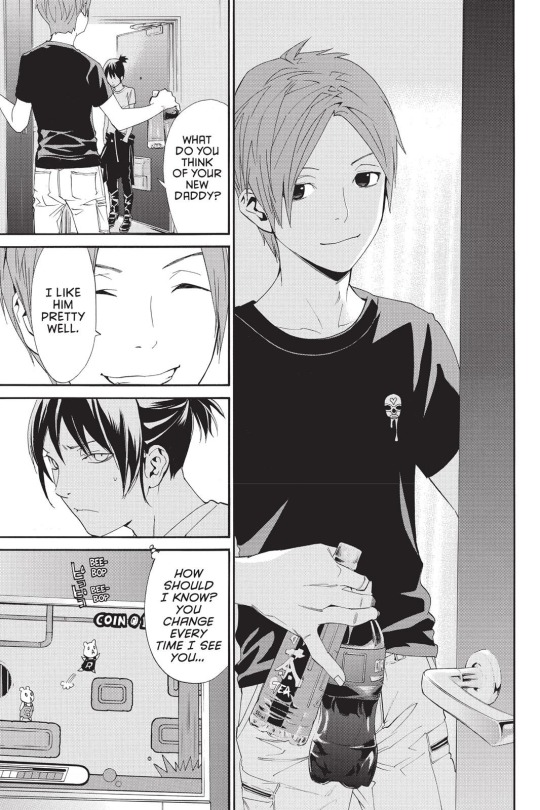
but also from the very first scene Father was in. Yato saw how Fujisaki caught Hiyori, and if he knew that the guy was his father, he definitely would have warned her to stay away. Granted, Yato probably didn’t see the guy’s face, but it doesn’t change the fact that Yato first saw what Father now looks like in the year the events of the manga currently take place – after 2010.
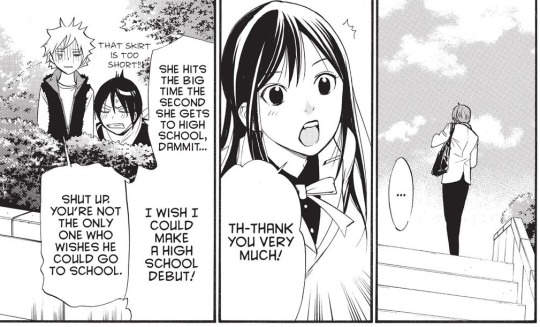
Except we see in the Volume 8 omake that Father collected articles about the “Yatogami miracle” from 2000′s, too – when Fujisaki was barely in primary school. (I don’t know if I need to explain this, but just in case it confuses you. I’m not talking about who and when was collecting the papers. What I mean is that Yato worked as a magatsukami in 2000′’s when Fujisaki was only a child).
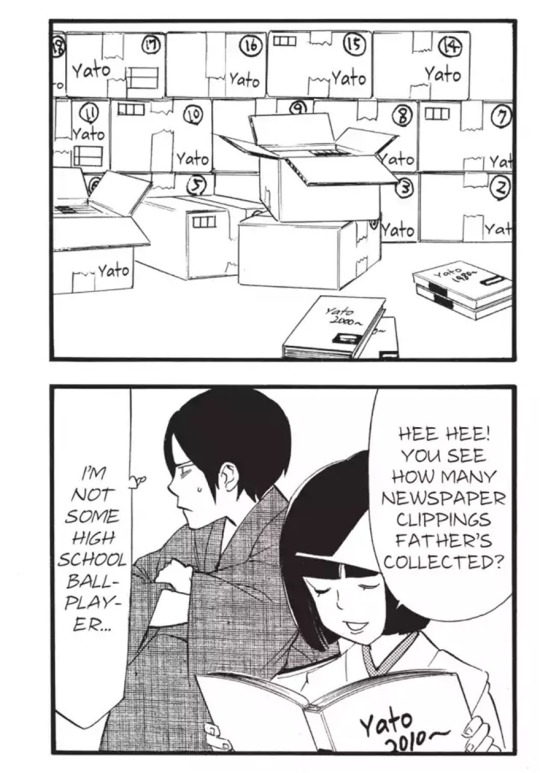
Could Nora have been the one to make Yato go back to his work as a magatsukami all on her own on those occasions when Father couldn’t command him, being a grown man in the body of an infant or a child with all the restrictions that come with it (also, gross)? She was able to deliver him to Father using the masks, but for the most part she was just following his orders. So I’m really curious what Father meant when he said that he “didn’t get to chose”. Does it mean he has to be reborn as a baby each time he dies? Or maybe two souls are just too much for one body to handle, thus he has to switch them quite often and at the most inconvenient times, so he just uses whoever is available? He had to change schools to spy after Yato and Hiyori because Kouto didn’t live in Tokyo, and he seems to somewhat care about his “sister” and “nieces”. But his being out of Yato’s life for a solid decade after each rebirth (before he at least has some freedom of movement, being a child and all) is too good to be true.
And even though I’ve said we don’t know for sure if he had a body after his return from Yomi, I’ll just go out and say that he had – his own body, no less, the one we saw in Yato and Nora’s memories. He had to be human to have wished Yato into existence in the first place, and since his appearance back then matches his current looks, he could have initially returned into his own body.
After all, time flows differently on the Near shore and on the Far shore. Although so far we’ve only seen that the passage of time is slower both in Yomi and Takamagahara.
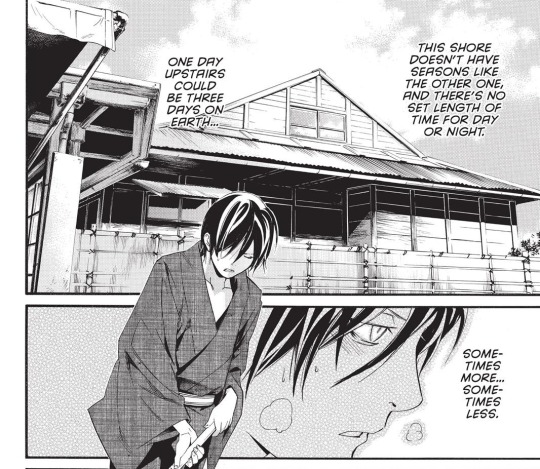
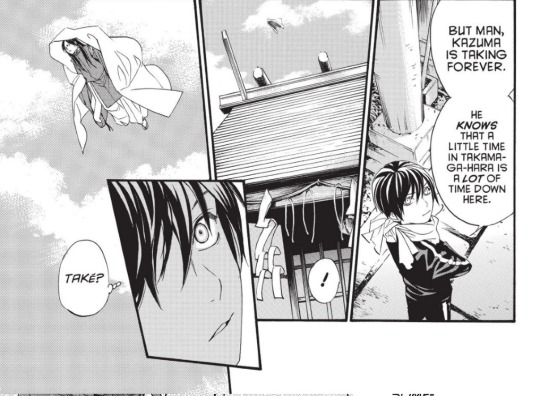
Is the opposite possible? Could it be that while Father was in Yomi, very little time has passed in Nakatsukuni, so instead of burying Father the girl tried calling him back and succeeded? It’s a wild guess, but if day and night don’t have a set length on the Far shore, then it means that one day in Yomi can also be shorter than one day on Earth.
In any case, if Father did come back to his own body, it lasted for a while – at least until Yato was a teen.
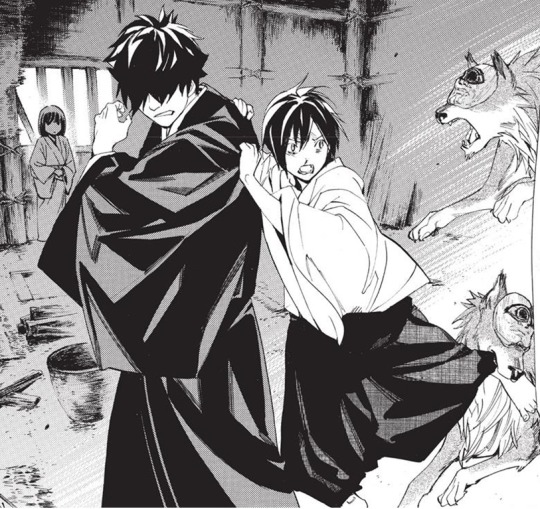
Another thing that bothers me is how come Yato didn’t know what Father looked like after an entire month of staying in that cottage. Did Yato never look at him during that whole time? Or would Father come to the cottage as himself? We know that his soul can separate itself from Fujisaki’s, but is it accidental or intentional?
Look at his latest encounter with Hiyori.
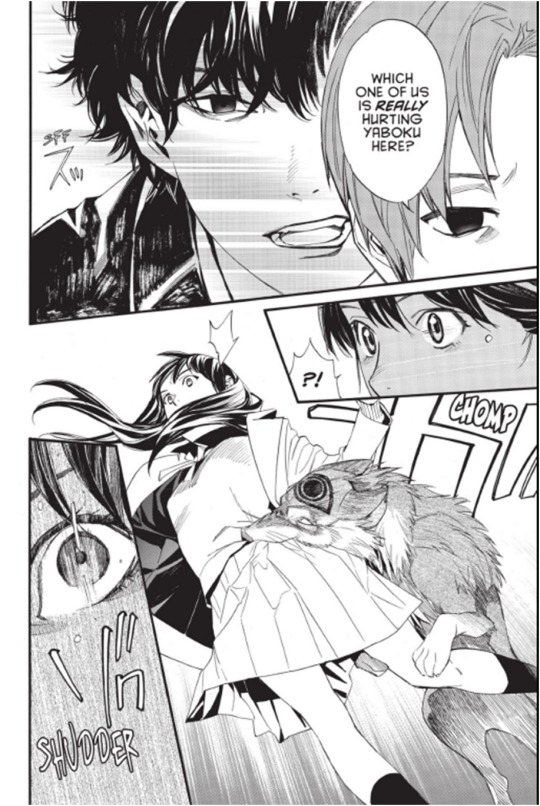
Father showed himself for a split second, distracting Hiyori and letting the ayakashi bite her. Did he accidentally “slip out” because of his strong emotions, or did he do it deliberately to make Hiyori lose focus and be an easy target for his doggies? The second one is a very Father thing to do, and if he can separate himself from Fujisaki from time to time, it explains why Yato didn’t know he looks like a student now. However, he was Fujisaki when he came to collect Nora after the whole ordeal with Ebisu.
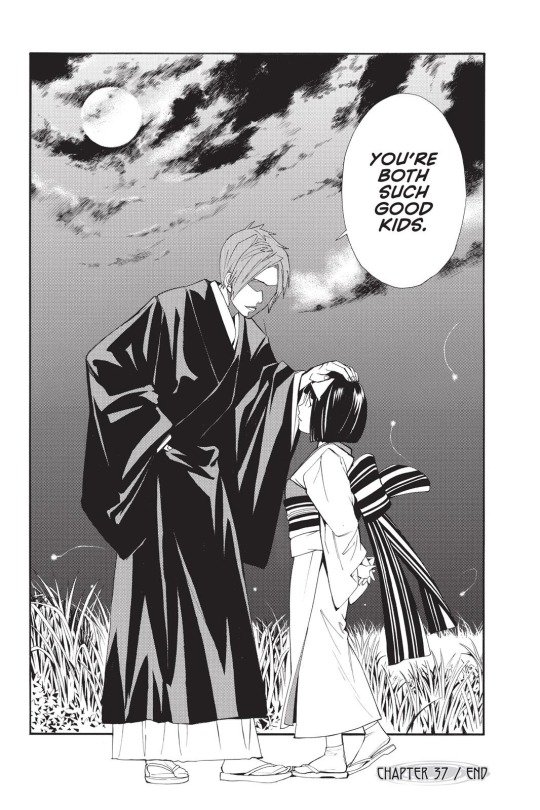
Maybe Yato only saw Father that one time during his entire stay at the cottage – when Father ordered him to go to Yomi. This way it’s possible that Yato indeed never looked at his face. Except chapter 29 seemingly disproves that.
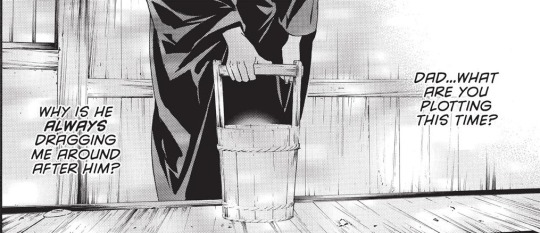
The background to Yato’s thoughts is Father putting down the bucket with purifying water in it. If this is just to remind us that this person is Father, I’m fine with it. But if this is Yato’s memory, something he saw with his own eyes, then it can only mean that Father did not look like Fujisaki then.
TLDR: I think that Father came back from Yomi because the pock-marked girl resurrected him via soul summoning and died in exchange, accidentally or voluntarily. I’m not overly attached to this theory and I won’t be surprised or disappointed if it’s never confirmed. It was just fun to dig into Father’s possible past once more.
P.S. while I was reading the soul summoning scene, the inconsistencies in Amaterasu’s actions and words (“call him like in a soul summoning” – “people can’t come back from Yomi”, “call him by his real name” – “are you the one called Yatogami?”) made me entertain the idea that the girl who helped the gang wasn’t Amaterasu, rather her lookalike. Like her twin sister Tsukuyomi? They weren’t twins according to the Japanese mythology as far as I know, but in other mythologies the sun and the moon are twins *cough Greek cough*, and we’ve already seen that Adachitoka don’t exactly retell mythology but adapt it however they like. I did cast away the thought since there was too much focus on the sun during the scene, but it’s still a fun little idea.
155 notes
·
View notes
Text
I never actually posted the little story behind the demon/priest flareshipping thing did I? I was just gonna type out something short and quick but the details got away from me. tl;dr seto becomes a priest to look for mokuba, summons atem for help and accidentally summons yugi too. the nun garbs are easier to hide the horns, tails, and wings under while they help him.
It’s like, not quite modern day, just far enough ago that travelling from Japan to Europe would generally be done by boat and land bc there were no planes.
circa 1875 CE, Japan, Meiji Restoration
Seto and Mokuba still get sent to an orphanage, and Mokuba gets adopted by a visiting Englishman without Seto, who tells him to go with and that he promises to find him, because it would be a better life than staying in the orphanage.
Seto almost ages out of the system when some travelling missionaries happen to come through town, but secretly they’re actually demon hunters/exorcists on a mission (though of course every country has their own ways of dealing with demons, sometimes if the demons are foreign, they need foreign magic to help stop them. In this instance, a coastal city in Japan was having issues with Scottish kelpies of all things. Wherever they went, they teamed up with the local demon hunters as well). The group stopped by the orphanage both to keep up appearances but also scout for talent, and catch wind of a really smart, stubborn kid named Seto who sounds like a perfect apprentice.
Seto agrees to go with them because they can promise to take him to Europe where he can search for his little brother. He finds out later about the demon hunter thing but doesn’t believe them, until he watches them do their job - unless a demon wants to be seen, it can’t be, unless you force-reveal or see it with magic of some sort. The power (both magical and influential), the control, and the ability to help people (though he won’t admit it) attracts him and he eagerly begins learning. Though he tends to feel like if the person is a douchebag they deserve their demon problem (his guardians try to teach it out of him to varying degrees of success)
It takes ages to get to Europe, and they do missions (from angels, messages from the vatican, towns they pass where there are problems they can solve, a few memorable times from other demons), and teach him along the way - surprisingly about many different religions, not just catholicism, as well as many different languages which he picks up quickly. The lessons about different demons and magic and curses were the most interesting: different places in the world have different supernatural beings, matching up with the different religious stories and mythology, and so of course they needed different magicks and tactics to defeat, release, or otherwise overcome. They attempted regular schooling too but Seto was already at or above their levels, so instead they taught him everything they knew. They taught him how to sew and weave, how to shoe a horse, fix a boat, cook, clean, among various other things.
circa 1880 CE, Europe, second industrial revolution
Thus, the whole trip takes quite a while. Seto is twenty by the time they actually make it to Europe, and while the time taken frustrates him, he knows it was safer and cheaper to do it this way, rather than try to get the money by himself and travel alone. That, and all the magic he would’ve never known.
Once he’s there, he travels along with them for a bit, trying to find leads to the family that has his little brother, but once they need to be sent out to different countries and continents again, he begins to travel alone. Sometimes he spends up to nearly a few months in one place, taking care of a big problem.
On his own, Seto learns that demons themselves are much more complex than he was originally taught - in terms of individuality, motivations, social hierarchy, and ven morality. He meets demons better than most people, and people worse than most demons. Some spirits are just mischievous, and people lie about how much damage they’ve done. He ends up capturing demons sometimes in order to study or interview them before banishing them or letting them go. He rarely actually destroys any unless they’re particularly bad. He also gets closer to some of the angelic messengers, and decides all angels are mildly to viciously annoying, especially the one named Joseph and his friend Tristan.
Eventually he gets frustrated with his total lack of progress and commits a taboo - he summons a demon himself. The book of spells he borrows from a local boy - Japanese like himself but raised here in England. He has white hair and claims to be a psychic, the ghost of his little sister following him around the occultish store, stocked by things his father brings back from travels that can’t go into the museum. Seto knows better by now than to doubt him.
He accidentally summons two. He refuses to place the blame on himself for not calculating things perfectly, and calls it a fluke of magic.
circa 1300 BCE, Egypt, middle New Kingdom
Atem had been a prince in Egypt, destined to be a greater pharaoh (and a greater man) than his father, but his traitorous uncle killed him on the eve of his coronation, just after the mourning period for his father was over. The magic interacted with his own, and with the artifact he wore, and with whatever divine influence the gods deemed to throw his way, and instead of going through the trails of the afterlife to enter the duat and be reborn again, he became a being of shadows and magic itself. Little did the uncle know that he would fall and be torn down by another boy wanting revenge just the next day.
It took Atem a long time to come to terms with what happened, and even longer to learn how to use and control his powers. By the time he could return to his home, too much time had gone by. Everywhere he went people spoke as the sea people spoke, foreign rulers by the name of Ptolemy sat on the throne, temples and statues were decimated or else reclaimed by these others in place of their original deities. Everyone and everything he’d known and loved were long gone. Upset, he travelled the worlds above and below. As is his nature, when he found something unjust, he did his best to set things right. As is his new nature, he judged by luring the accused into games to test their hearts.
He stays mostly solitary for nearly 3000 years - not entirely by his own choice, but by circumstance. He’s old and powerful and appeared out of nowhere, and other beings of all kinds are wary of him. Until he comes upon a sweet, hurting boy named Yugi who asks to be his friend.
circa 1820 CE, Japan, near the end of the Edo period
Yugi is very smart, and very small, and very nice. His niceness often gets taken advantage of, and his size makes it easy to pick on him. If he fought back, maybe they’d leave him alone, but he hates hurting anyone. His grandfather, a merchant, always tries to convince Yugi to stand up for himself. Yugi doesn’t listen. He gets sadder and more reclusive by the year, until he barely looks anyone in the eyes anymore, even his own mother as she helps bandage him up from the latest “game” that horrible group of older kids “played” with him.
In an effort to cheer up his grandson, Sugoroku gives him a golden puzzle from a far away land. He’d been hoping to make big money off it, but they were well-enough off as is, and his grandson’s happiness mattered more than some extra coins in his pocket. He’d known the puzzle was difficult, but it takes even Yugi years to complete it. Years of suffering, and growing, and learning. His grandfather worries. Yugi is of course interested in taking over Sugoroku’s business, and already assists him greatly, but without being able to stand up for himself the boy will have trouble in the world. He worries as well about revealing the truth to Yugi - the truth that Sugoroku is himself a demon, and so his son, and so is Yugi, though to a much lesser extent since Yugi’s mother is human.
When Yugi completes the puzzle, it immediately summons a disoriented and shocked Atem to his side. Cue screaming and yelling from both of them, a rather hilarious scene of Yugi chucking the puzzle at Atem’s head reflexively before hiding behind an upturned table. Atem, freaked out by what just happened, also takes cover behind a screen. He’d never been summoned like THAT before, it felt completely different to a summoning circle or a prayer or anything else, and certainly never by someone who immediately started screaming at him.
Tentatively, after the dust settles, Yugi peeks out from behind the table. Atem hears him shifting and peaks out as well. More silence. Yugi tries to come to terms that he’s summoned what appears to be a demon. Atem tries to come to terms with how cute the screaming young man is. Yugi clears his throat and offers a shaky greeting. Atem falls in love.
Eventually they end up in the middle of the cleaned up room, sitting on the floor, having a somewhat stilted conversation. Atem fiddles with the puzzle - what was once his magical artifact - sitting on his lap. There had been no contract, no promise, no injustice to either force or encourage Atem to stay, but he couldn’t find it in himself to leave. By the time it was dark outside, the two of them were laughing together, munching on the snacks Yugi had made while preparing dinner for his grandfather and mother, who were on their way back home from a day trip to the big markets. The knife Yugi’s using to chop the vegetables slips and slices open the base of his thumb, and while it’s not deep the pain surprises him. Atem automatically reaches out to gasp the injured appendage. This is the first time they’ve touched.
The sheer power released by Atem touching Yugi’s hand awakened Yugi’s latent demonic side, and it takes Atem a while to calm him down. The new little horns, and long ears, and wings, and tail... it was a lot to take in. Sugoroku and Ayame come home to find a delicious dinner and two demons waiting for them. It doesn’t bother them nearly as much as Yugi thought, and he finally learns the truth from his sheepish grandfather. Ayame is annoyed he’d stopped from from trying to tell him sooner, because now look what happened, you silly old man.
Atem, regardless of his feelings, didn’t want to tie the young demon down to such an old and feared one like himself, and intended to leave as soon as he knew Yugi was in good hands. But, he can’t just let Sugoroku teach him - even for a demon, he was quite old in body while Atem remained young (another thing people found terrifying, for just how much power did Atem have to appear naturally young after 3000 years?), so he stayed and helped train Yugi. Yugi did everything he could to impress Atem, not even realising his own feelings for a good while; once he did, he redoubled his efforts and became even more mischievous and flirty. Eventually, Atem couldn’t take it any longer and confessed, and they were bonded.
Seto was only trying to summon an ancient demon by the name of Atem, a solver of puzzles and bringer of justice, both to help him look for Mokuba using demonic magic and to possibly learn from him. Seto also gets Atem’s equally tiny boyfriend, Yugi, who is not even nearly ancient but quite older than Seto, a fact that irks him greatly as they’re both shorter than he was at age 12.
But, they’re both so, so clever. And so, so... hard to resist. He wants to hate it, wants to believe they’re magically influencing him somehow, but he’s too confident in his abilities to believe it.
Seto enters a joint contract with them (though Yugi was willing to help even without one, but it has it’s benefits). Together, they hunt down particularly nasty pests and find major leads to Mokuba. And fall in love, of course.
81 notes
·
View notes